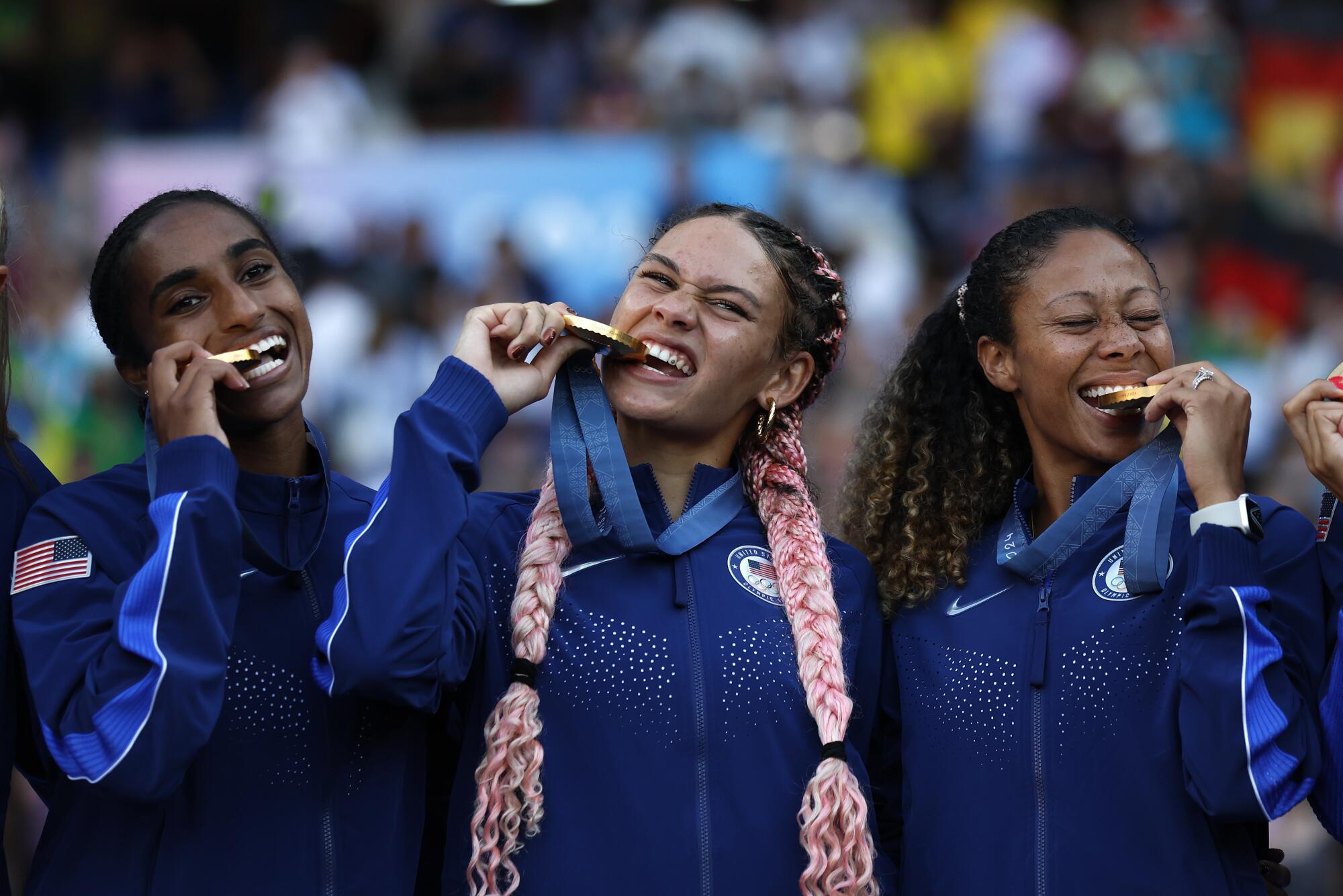Trinity Rodman is taking a coffee break.
Not a break for coffee. A break from coffee. Specifically espresso.
Last summer Rodman and teammates Mallory Swanson and Sophia Wilson (née Smith) combined for 10 goals and five assists to lead the U.S. to its first Olympic title in women’s soccer in a dozen years. One of the three had the go-ahead goal in all six American wins in France, a performance deserving of a catchy nickname. So the caffeinated trio called themselves Triple Espresso.
But Triple Espresso hasn’t been on the USWNT menu since the gold medal game in Paris, the last time the three played together for the national team. And a reunion won’t happen anytime soon since Swanson remains out on a “personal break” and Wilson is on maternity leave.
Rodman, however, is back in training camp in Southern California and could play for the U.S. on Saturday when it meets Brazil at SoFi Stadium in a rematch of the Olympic final. But if she has any coffee while here, she’s planning to stick with decaf.
“I used to really like espresso,” said Rodman, who is building up her playing time after missing four months with a back injury. “The national team has a lot of coffee drinkers. That’s their favorite hobby.
“After you have coffee for a very long time every single day, I’m like yeah, it’s time to take a little bit of a break.”
Rodman is the straw that stirs the espresso. At 22, she is the youngest and arguably the most vocal, energetic and recognizable of the trio, often playing with long pink braids trailing after her.
And the trip to Inglewood, where the USWNT will be playing in the world’s most expensive stadium for the first time, will mark a homecoming for Rodman and her mother Michelle Moyer, who moved from south Orange County to Washington, D.C., after Rodman was drafted by the Washington Spirit in 2021.
“I have a lot of friends and other extended family that will, for sure, come. So I have to scramble for some more tickets,” Rodman said. “My priority is my sister, niece and nephew and my mom.”
Trinity Rodman, center, and her U.S. women’s soccer teammates take a bite of their Olympic gold medals during their podium celebration at the Paris Games.
(Aurelien Morissard / Associated Press)
As for the transition taking place on the field, every training camp and game brings adjustments, she said.
“You’re always kind of changing and adapting and playing with different people,” said Rodman, who played 63 minutes for the Spirit on Friday, her longest performance since November’s NWSL title game. “It was nice to play really good soccer with Soph and Mal. But it’s part of the game now with new faces and younger players coming into the national team.
“It’s another opportunity to, I don’t know, build off that and be challenged in different ways.”
One of the younger players invited to camp to challenge Rodman is Angel City forward Alyssa Thompson, 20, who scored her first international goal last fall and will likely get additional playing time with Wilson and Swanson out.
“I would hope that I would be in a good position to be picked if they were here or not,” said Thompson, who scored her second goal in three matches for Angel City on Sunday. “But it is a good time to kind of showcase myself. Hopefully I’ll be able to get more minutes since Mal or Soph aren’t in.”
Swanson and Wilson aren’t the only Olympians missing. Also out are defenders Naomi Girma and Jenna Nighswonger, midfielder Rose Lavelle and forward Lynn Biyendolo (née Williams). For coach Emma Hayes, the games against Brazil — the teams will meet again in San José on April 8 — offer a chance to build roster depth and gain more experience. The 24 women she called to camp average 25 years old, and 11 of them have 10 or fewer caps at the senior level.
“It gives our less experienced players another opportunity to see where we measure up,” she said. “I always try to compete to win, but I also know and understand development and the importance of development is that you have to take these hard lessons early on, then work with the players to keep growing on it.”
When Hayes took over the USWNT last summer, she felt the pool of young players had been allowed to languish. Replenishing that, she said, will take time.
“I took over a team that hadn’t developed a lot of players for a long period of time in terms of playing opportunities. You can’t do that by talking about it. You have to do it,” she said. “But if you’re going to do it, you have to accept that they’re not going to be as polished in all areas of their game.
“We want to build subsequent teams that can compete again and again and again. To do that with the level of where the game is worldwide, we have to go through this process.”
And for the time being, they’ll be going through it with just a single espresso.
⚽ You have read the latest installment of On Soccer with Kevin Baxter. The weekly column takes you behind the scenes and shines a spotlight on unique stories. Listen to Baxter on this week’s episode of the “Corner of the Galaxy” podcast.
